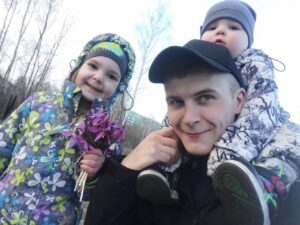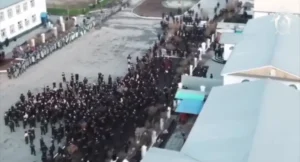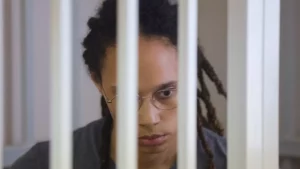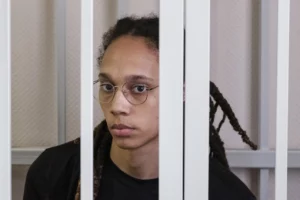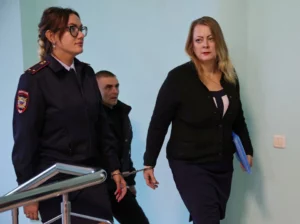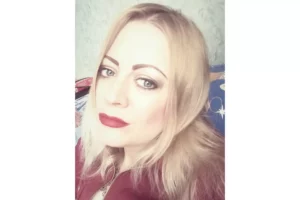In the town of Kineshma, located in Ivanovo region, the trial of the administration of Women’s Correctional Colony #3 is coming to an end, regarding an incident in which two convicts died while working in a sewer well. “Russia Behind Bars” is providing legal support for this case.
In late June 2021, the heat exceeded 30°C (86°F) for several days. On Saturday, the 26th, two inmates from Colony-3, Victoria Vinogradova and Evgeniya Fomicheva, who were assigned as sanitation workers, noticed a clogged sewer well and sewage spilling out from neighboring wells.
Olga Bendas (Recognized by “Memorial” as a political prisoner, and daughter of General Valery Khomitsky of the Investigative Committee), who was imprisoned in this colony, remembers that the sewer system always worked poorly: “You could smell the stench coming from the grates a kilometer away, especially in the summer heat. During formation on the grounds, which could last from half an hour to an hour, it was unbearable. You could get poisoned from it.”
The sewage network of the Federal Penitentiary Service Colony-3 in the Ivanovo region was commissioned in 1993-1994. It comprises forty-nine isolated wells connected by a system of cast iron, asbestos, and polyvinyl chloride pipes with diameters 110, 200, and 250 millimeters, totaling 901.6 meters in length.
And so, seeing the clog, Vinogradova and Fomicheva attempted to clean it up. Realizing they could not handle the situation, the inmates left to go report what was happening at the duty station.

How to become a sanitation worker
A digression is necessary here. As it was established in the investigation and trial, Vinogradova and Fomicheva’s employment as sanitation workers was illegal. The Ministry of Labor sanctioned a specific list of hazardous jobs that women are prohibited from working in. The list includes “Work involving the cleaning and repair of sewage networks” and “Work in wells, liquid waste pits and tanks, silos, and hay towers”. And that’s it. The administration of the colony isn’t foolish enough to go against the orders of a federal ministry, however, they found a workaround. On June 2nd, 2020, in Colony-3, an assessment was conducted regarding the profession of “Cleaner of sewer tunnels and canals”. The result was “acceptable working conditions” for women in this job. In the course of the investigation it was established that this assessment of working conditions was conducted “in gross violation of accepted standards”.
On that day, the duty officer was the head of the colony, Nikolai Belyakov. Upon listening to the inmates, he ordered them to contact Sergei Kuvaev, the chief engineer of Colony-3. He is primarily responsible for handling such situations and could have come to the colony himself on one of his days off. However, according to the case materials, Kuvaev limited himself to oral instructions over the phone, so the inmates could descend into well number 23 and clear it themselves. This job took place in a confined space with hazardous gasses.
For this kind of work there are clear instructions (as it’s known, all safety instructions are written with somebody else’s blood): The necessary equipment includes gas analyzers, masks with replaceable filters, and a belay so that the person in the well can be pulled up quickly. The investigation found there were two gas powered Robin-Subaru motor pumps registered to the chief power engineer. They could have been used to clear the blockage, but the convicts were not allowed near such equipment. In the case materials there is information about the availability of a device in the colony used for remotely deploying a rope into the sewer channel. This device also “didn’t come in handy”. All Vinogradova and Fomicheva brought with them was a rope and a ladder.
It should be explained why Vinogradova and Fomicheva ended up in their positions. The primary work in Colony-3 is garment sewing. As Olga Bendas explains, inmates receive around 200 rubles a month for their labor. With this, one can afford either a couple of bars of soap, one pack of menstrual pads, or one pack of cigarettes. There are also jobs available in the boiler room, bath, canteen, and library. And finally, the option of cleaning the sewer, which pays 800 and even 1000 rubles a month (about $11). “For those who generally don’t have options to ‘warm up’ (in other words, receive parcels from outside. – K.M.), there isn’t any other choice: either die from hunger or go swim in shit,” – Olga Bendas explains. – “But prisoners shouldn’t have such a choice. Women can’t climb down a manhole. Women can’t clean sewers.”
Circumstances of death
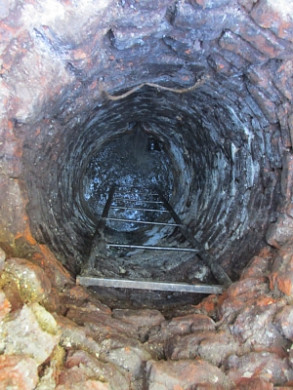
In the case materials there is a “Report on the Investigation of a Serious Incident”, which describes what happened in detail.
At 15:05 Vinogradova and Fomicheva opened well number 23, the only one from the neighboring wells that hasn’t flooded. The depth of the well is 3.5 meters. The inmates take turns descending the well and cutting the blockage with rope until Vinogradova starts to feel sick. Fomicheva pulls her up by her arm (remember, that both of them are working without a belay). At 15:42 another inmate, Alena Denisova, who was working as a stoker in the boiler room, passed by. Denisova sees Fomicheva climbing down the well and losing consciousness. At 15:45, Denisova climbs into the well to help Fomicheva, and Vinogradova runs to the duty station to get help. At 15:47, Vinogradova runs back to the area from the duty station along with Elena Sorokina, acting as the assistant to the head of the colony. Two minutes later senior dog training instructor, Alexey Kondratev, runs over to the incident. They see that Denisova has also lost consciousness and is lying at the bottom of the well. Sorokina runs to report what has happened to the duty desk, and Kondratev follows the women into the well and also loses consciousness. A call to a single emergency number is received at 15:58. Rescuers pulled Alexey Kondratev out alive, in moderate condition. The deaths of Alena Denisova and Evgeniya Fomicheva were confirmed in the ambulance at 19:37, cause of death – sewage gas inhalation.
Victoria Vinogradova was diagnosed by a medic with a case of mild poisoning, a week later she went back to work. This is an important detail: subsequently during the trial, Vinogradova had her victimhood status removed on the basis that she suffered “minor injuries”.
Investigation and trial
The criminal trial was initiated with the charge of “Negligence” (Part 3, Art. 293 of the Criminal Code, the maximum sentence is 7 years in prison). During the course of the investigation the charge was “corrected” to a lighter one – “Violation of labor protection requirements” (Part 3, Article 143 of the Criminal Code, up to 5 years in prison). In other words, from the point of view of the investigation, this is a crime committed in the form of carelessness. The investigation continued for several months, and the trial regarding this case is still dragging on.
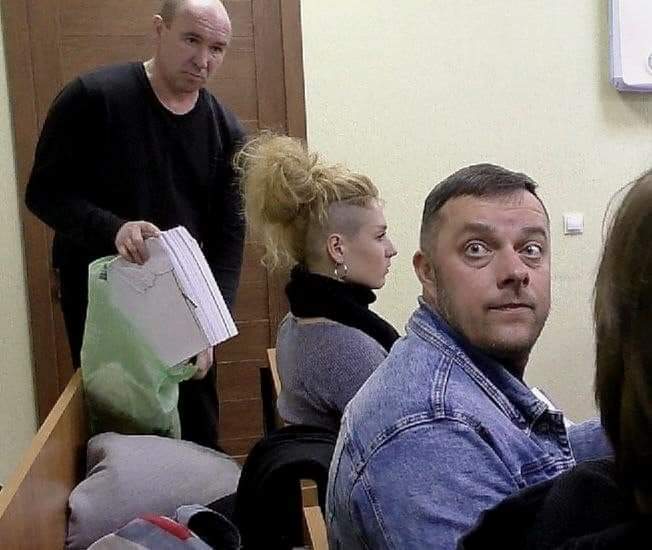
taken by human rights defender Pyotr Kuryanov).
Sitting on the defendant’s bench is the head of Colony-3 Nikolai Belyakov, chief engineer Sergei Kuvayev, and head of the Department of Public Utilities, Intendant and Economic Provision Dimitri Lisovski (all positions are named as of the day of the tragedy). None of them have admitted guilt. According to the defendants, the convicts violated the safety standards without the management’s knowledge.
Attorney Oscar Cherdzhiev represents Evgenia Fomicheva’s sister Elena at the trial (recognized as a victim of the case). Cherdzhiev calls the defendant’s version of the events crude: “They say that no one gave the inmates a direct order to clean this well, that they allegedly went there on their own initiative, even though someone gave them keys to the well, ladder, and cable.” The attorney stresses that no convict would do dirty work on their own initiative, especially almost for free. “In addition, prisoners must be under constant supervision 24/7,” – Cherdzhiev, the attorney, continues. – “Even if we take into account the defendants’ version of the events, the colony staff should have seen that the prisoners were violating the regime, and they should have been stopped.”
Elena Fomicheva, the sister of Evgenia Fomicheva, who attended the trial, shares that she doesn’t understand how the defendants can blame the deceased: “God will punish you for saying that the dead are to blame. No one can cancel the boomerang effect.”
Victoria Vinogradova, Alena Denisova, and Evgenia Fomicheva
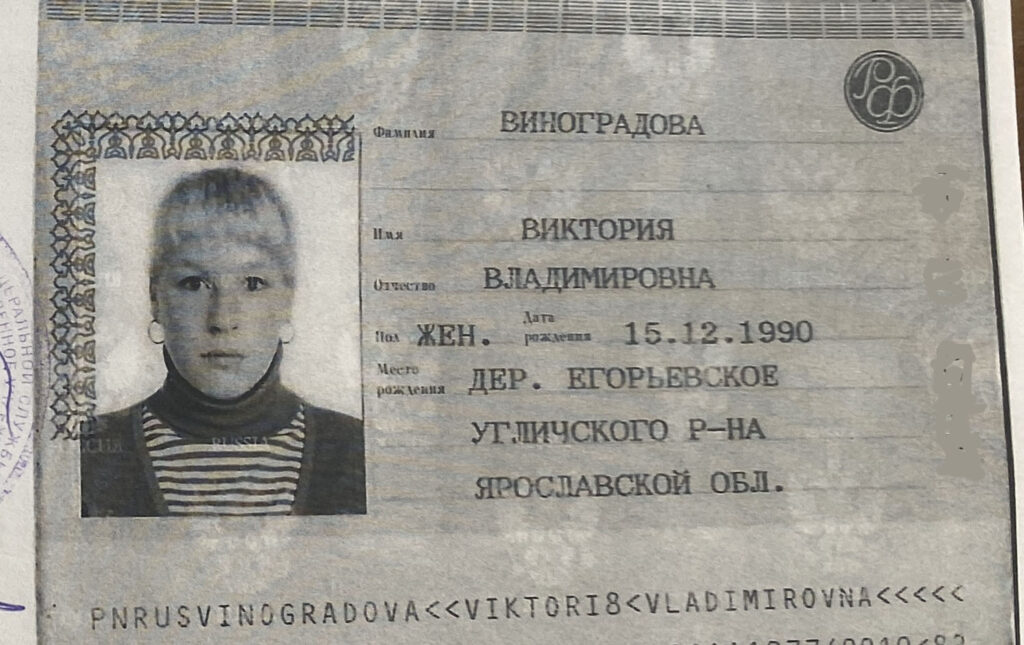
Victoria Vinogradova was convicted on the 30th of December 2020 for the charge of “Intentional infliction of minor bodily harm” (Part 2, Art. 115 of the Criminal Code), taking into account a previous sentence, she received 5 years and two months. The materials of the case indicated that she is unmarried. Victoria has 3 children, of whom she has lost custody.
On June 30th, 2021, while under victimhood status, Vinogradova stated in an interview that she was feeling well. She received assistance at the colony infirmary, where the “minor injuries” were established. As it was mentioned before, this was what made it possible to strip Vinogradova’s victimhood status. Olga Bendas was in the same unit as Vinogradova during her time in prison. Having already finished her sentence, Bendas wrote to the prosecution as well as the regional public advisory committee. She demanded that Vinogradova be transferred to another colony as a witness in a criminal case: “Vika wrote to me that she was ready to be transferred anywhere and complained that she was denied a life in Colony-3. They summoned her to explain how to behave in court and to reprimand her for writing to me”. For the past three months no letters to or from Vinogradova reached their destination.
“Vika is just like all those unfortunate sufferers: quiet, modest, unresponsive.” – says Olga
Bendas. – “Wherever she’s sent, that’s where she’ll go. She kept her head down. She was hoping for parole, she said she had three kids she needs to get back to and restore her custody”.
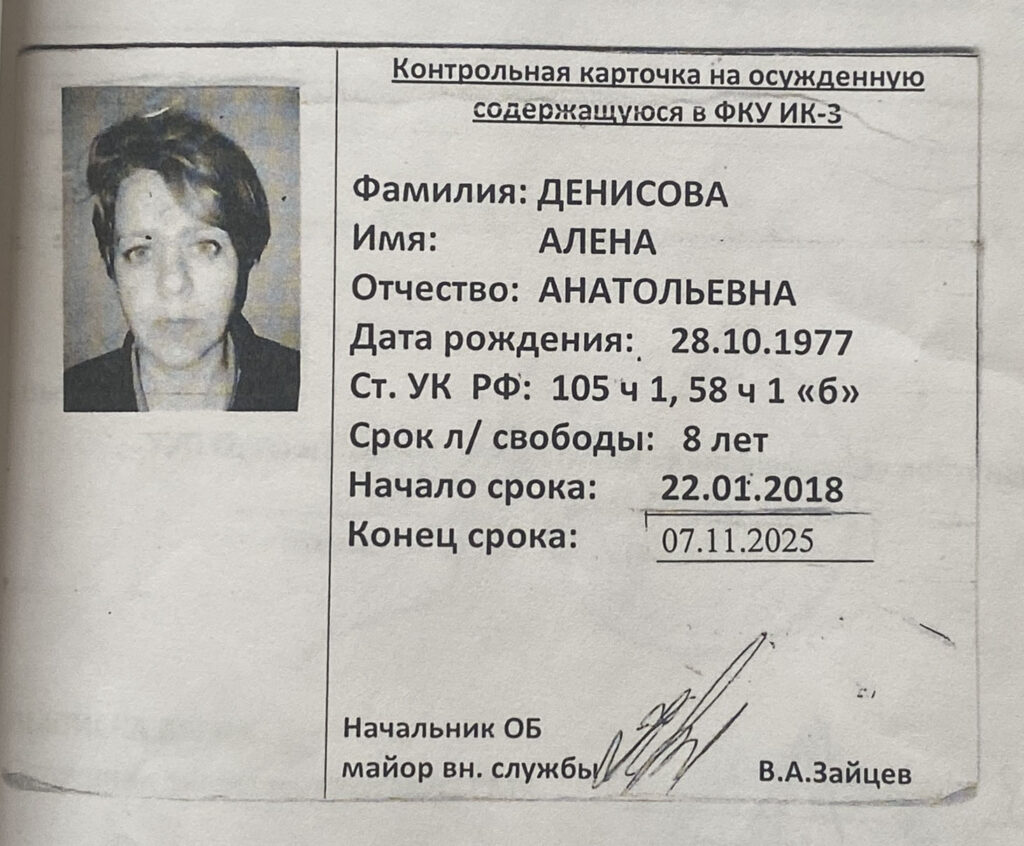
Regarding Alena Denisova, it’s known she was imprisoned for killing her husband. On the outside she had two children born in 1999 and 2004. Denisova was also deprived of custody over them.
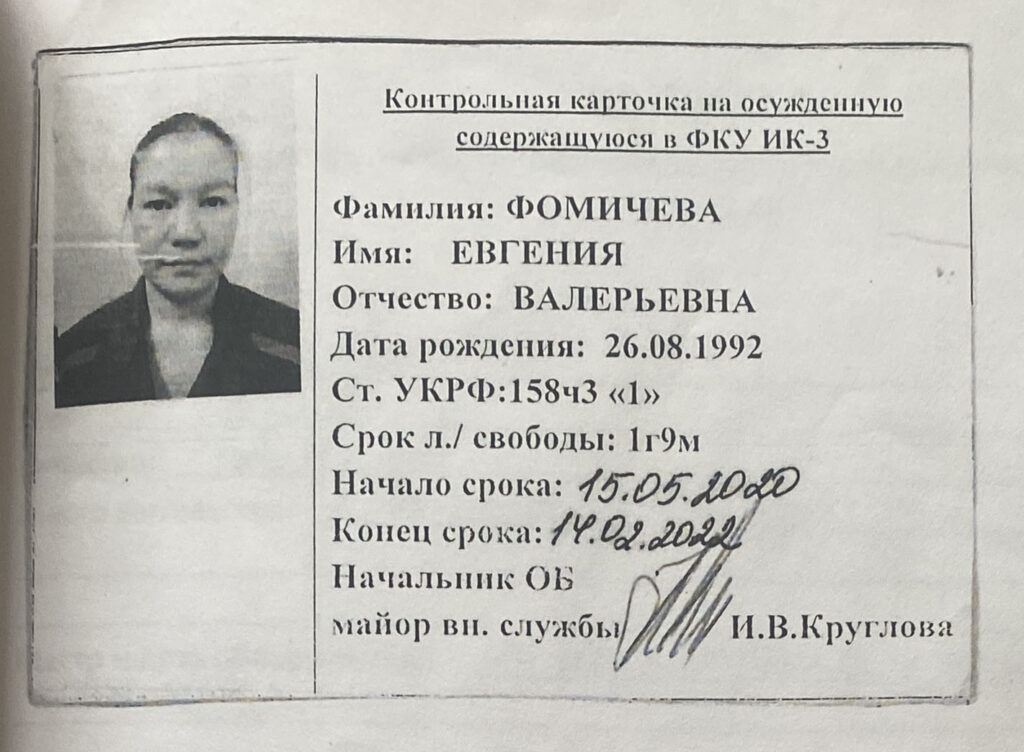
Evgenia Fomicheva went to prison for theft. When she was free she had a child who was taken away from child protective services shortly after being born. 5 years before her death Fomicheva suffered a terrible tragedy. She was from a problematic family, orphaned early on, and went through an orphanage. It all happened in Rybinsk (Yaroslavl region), where Fomicheva lived in a small wooden house. By that time, she had two children, a one and a half year old daughter and a four year old son. She was pregnant with her third child. That day she was drinking with her boyfriend, and when she went to the store, a fire broke out. The children couldn’t be saved, and the boyfriend was sent to the hospital with extensive burns.
Evgenia Fomicheva’s sister said that if it wasn’t for that tragedy and her family members, then both her sister and Alena Denisova could have been released and reformed, that something would have changed in their lives: “I don’t want the readers to come away with the opinion that they were just bad, that it was just the road they went down. They’re real people, they had their whole lives ahead of them.”
Kirill MIKHAYLOV


